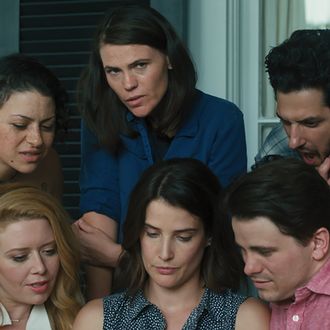
Being a first-time filmmaker with a movie at Sundance is a nerve-racking, exhausting endeavor. Even worse? Also being one of the leads. As Clea Duvall, the writer/director/star of The Intervention, revealed during the Vulture-moderated Women in Film panel and celebration in Park City, “I woke up every day not knowing how we were going to get done what we needed to get done.”
The Women in Film event, now in its tenth year, was a discussion between female directors who had films in the festival, and Duvall was sitting alongside fellow panelists Meera Menon (Equity), Sian Heder (Tallulah), Maggie Greenwald (Sophie and the Rising Sun), and Sheena Joyce (A Hug From Paul Ryan) as she discussed her experiences working on The Intervention. Despite having a number of credits to her name, including Girl, Interrupted, Argo, American Horror Story, and Better Call Saul, Duvall admitted that starring in her own movie lent itself to a special kind of anxiety.
“I was by far the worst actor in the movie,” she said, eliciting laughs from the crowd. “Directors are your safety net. They are looking out for you and want you to succeed. They see you in a way that you can’t see yourself. None of us have the skill to perceive ourselves the way others do. So trusting myself in a whole new way was really scary.”
The conversation also inevitably touched on pay equity in Hollywood, the struggle for women directors to get hired, and the often-painful dilemma of when and whether to have children. Heder, a veteran writer-producer on Orange Is the New Black, said she was pregnant with her second child before and during production on the Ellen Page vehicle Tallulah — and she dreaded telling her financiers for fear they would pull out of the project.
“I even ate an oyster at a dinner meeting to play it off like nothing was going on,” said Heder, who joined with Joyce — also with a child in tow at the festival — in voicing frustration that the festival doesn’t offer child care for filmmakers traveling with their families.
“It would be a huge help, but it’s hard regardless,” said Heder. “I mean, I was across the street pumping before the panel started.”

